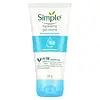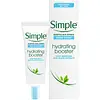What's inside
What's inside
 Key Ingredients
Key Ingredients

 Benefits
Benefits

 Concerns
Concerns

 Ingredients Side-by-side
Ingredients Side-by-side

Water
Skin ConditioningGlycerin
HumectantDimethicone
EmollientButylene Glycol
HumectantIsohexadecane
EmollientPropylene Glycol
HumectantAmmonium Acryloyldimethyltaurate/Vp Copolymer
Caprylic/Capric Triglyceride
MaskingPhenoxyethanol
PreservativeCaprylyl Glycol
EmollientTocopheryl Acetate
AntioxidantHydrogenated Poly(C6-14 Olefin)
EmollientAmmonium Acryloyldimethyltaurate/Beheneth-25 Methacrylate Crosspolymer
Emulsion StabilisingLinoleamidopropyl Pg-Dimonium Chloride Phosphate
Stearic Acid
CleansingSodium PCA
HumectantDisodium EDTA
BHT
AntioxidantSaccharide Isomerate
HumectantSodium Citrate
BufferingCitric Acid
BufferingPotassium Chloride
Sodium Chloride
MaskingWater, Glycerin, Dimethicone, Butylene Glycol, Isohexadecane, Propylene Glycol, Ammonium Acryloyldimethyltaurate/Vp Copolymer, Caprylic/Capric Triglyceride, Phenoxyethanol, Caprylyl Glycol, Tocopheryl Acetate, Hydrogenated Poly(C6-14 Olefin), Ammonium Acryloyldimethyltaurate/Beheneth-25 Methacrylate Crosspolymer, Linoleamidopropyl Pg-Dimonium Chloride Phosphate, Stearic Acid, Sodium PCA, Disodium EDTA, BHT, Saccharide Isomerate, Sodium Citrate, Citric Acid, Potassium Chloride, Sodium Chloride
Water
Skin ConditioningGlycerin
HumectantPentylene Glycol
Skin ConditioningButylene Glycol
HumectantDimethicone
EmollientPEG-8
HumectantAmmonium Acryloyldimethyltaurate/Beheneth-25 Methacrylate Crosspolymer
Emulsion StabilisingBenzophenone-4
UV AbsorberBHT
AntioxidantCaprylyl Glycol
EmollientCarbomer
Emulsion StabilisingCitric Acid
BufferingGlyceryl Acrylate/Acrylic Acid Copolymer
HumectantPEG-40 Hydrogenated Castor Oil
EmulsifyingPhenoxyethanol
PreservativePolyvinyl Alcohol
Potassium Carbonate
BufferingPotassium Chloride
Potassium Hydroxide
BufferingPvm/Ma Copolymer
Emulsion StabilisingSaccharide Isomerate
HumectantSodium Chloride
MaskingSodium Citrate
BufferingSodium Lactate
BufferingT-Butyl Alcohol
PerfumingTrideceth-9
EmulsifyingWater, Glycerin, Pentylene Glycol, Butylene Glycol, Dimethicone, PEG-8, Ammonium Acryloyldimethyltaurate/Beheneth-25 Methacrylate Crosspolymer, Benzophenone-4, BHT, Caprylyl Glycol, Carbomer, Citric Acid, Glyceryl Acrylate/Acrylic Acid Copolymer, PEG-40 Hydrogenated Castor Oil, Phenoxyethanol, Polyvinyl Alcohol, Potassium Carbonate, Potassium Chloride, Potassium Hydroxide, Pvm/Ma Copolymer, Saccharide Isomerate, Sodium Chloride, Sodium Citrate, Sodium Lactate, T-Butyl Alcohol, Trideceth-9
 Reviews
Reviews

Ingredients Explained
These ingredients are found in both products.
Ingredients higher up in an ingredient list are typically present in a larger amount.
We don't have a description for Ammonium Acryloyldimethyltaurate/Beheneth-25 Methacrylate Crosspolymer yet.
BHT is a synthetic antioxidant and preservative.
As an antioxidant, it helps your body fight off free-radicals. Free-radicals are molecules that may damage your skin cells.
As a preservative, it is used to stabilize products and prevent them from degrading. Specifically, BHT prevents degradation from oxidation.
The concerns related to BHT come from oral studies; this ingredient is currently allowed for use by both the FDA and EU.
However, it was recently restricted for use in the UK as of April 2024.
Learn more about BHTButylene Glycol (or BG) is used within cosmetic products for a few different reasons:
Overall, Butylene Glycol is a safe and well-rounded ingredient that works well with other ingredients.
Though this ingredient works well with most skin types, some people with sensitive skin may experience a reaction such as allergic rashes, closed comedones, or itchiness.
Learn more about Butylene GlycolCaprylyl Glycol is a humectant and emollient, meaning it attracts and preserves moisture.
It is a common ingredient in many products, especially those designed to hydrate skin. The primary benefits are retaining moisture, skin softening, and promoting a healthy skin barrier.
Though Caprylyl Glycol is an alcohol derived from fatty acids, it is not the kind that can dry out skin.
This ingredient is also used as a preservative to extend the life of products. It has slight antimicrobial properties.
Learn more about Caprylyl GlycolCitric Acid is an alpha hydroxy acid (AHA) naturally found in citrus fruits like oranges, lemons, and limes.
Like other AHAs, citric acid can exfoliate skin by breaking down the bonds that hold dead skin cells together. This helps reveal smoother and brighter skin underneath.
However, this exfoliating effect only happens at high concentrations (20%) which can be hard to find in cosmetic products.
Due to this, citric acid is usually included in small amounts as a pH adjuster. This helps keep products slightly more acidic and compatible with skin's natural pH.
In skincare formulas, citric acid can:
While it can provide some skin benefits, research shows lactic acid and glycolic acid are generally more effective and less irritating exfoliants.
Most citric acid used in skincare today is made by fermenting sugars (usually from molasses). This synthetic version is identical to the natural citrus form but easier to stabilize and use in formulations.
Read more about some other popular AHA's here:
Learn more about Citric AcidDimethicone is a type of synthetic silicone created from natural materials such as quartz.
What it does:
Dimethicone comes in different viscosities:
Depending on the viscosity, dimethicone has different properties.
Ingredients lists don't always show which type is used, so we recommend reaching out to the brand if you have questions about the viscosity.
This ingredient is unlikely to cause irritation because it does not get absorbed into skin. However, people with silicone allergies should be careful about using this ingredient.
Note: Dimethicone may contribute to pilling. This is because it is not oil or water soluble, so pilling may occur when layered with products. When mixed with heavy oils in a formula, the outcome is also quite greasy.
Learn more about DimethiconeGlycerin is already naturally found in your skin. It helps moisturize and protect your skin.
A study from 2016 found glycerin to be more effective as a humectant than AHAs and hyaluronic acid.
As a humectant, it helps the skin stay hydrated by pulling moisture to your skin. The low molecular weight of glycerin allows it to pull moisture into the deeper layers of your skin.
Hydrated skin improves your skin barrier; Your skin barrier helps protect against irritants and bacteria.
Glycerin has also been found to have antimicrobial and antiviral properties. Due to these properties, glycerin is often used in wound and burn treatments.
In cosmetics, glycerin is usually derived from plants such as soybean or palm. However, it can also be sourced from animals, such as tallow or animal fat.
This ingredient is organic, colorless, odorless, and non-toxic.
Glycerin is the name for this ingredient in American English. British English uses Glycerol/Glycerine.
Learn more about GlycerinPhenoxyethanol is a preservative that has germicide, antimicrobial, and aromatic properties. Studies show that phenoxyethanol can prevent microbial growth. By itself, it has a scent that is similar to that of a rose.
It's often used in formulations along with Caprylyl Glycol to preserve the shelf life of products.
Potassium Chloride can be bad for oily skin and be bad for acne prone skin.
Saccharide Isomerate comes from sugars found in corn. It is a skin hydrator.
The structure of this ingredient can be altered to be more similar to the carbohydrates found in our skin. This ability to mimic our skin gives it hydrating properties.
Specifically, saccharide Isomerate is a humectant. Humectants draw moisture from the air to our skin.
Research shows Saccharide Isomerate to be an effective moisturizer.
Learn more about Saccharide IsomerateChances are, you eat sodium chloride every day. Sodium Chloride is also known as table salt.
This ingredient has many purposes in skincare: thickener, emulsifier, and exfoliator.
You'll most likely find this ingredient in cleansers where it is used to create a gel-like texture. As an emulsifier, it also prevents ingredients from separating.
There is much debate on whether this ingredient is comedogenic. The short answer - comedogenic ratings don't tell the whole story. Learn more about comegodenic ratings here.
The concensus about this ingredient causing acne seems to be divided. Research is needed to understand if this ingredient does cause acne.
Scrubs may use salt as the primary exfoliating ingredient.
Learn more about Sodium ChlorideSodium Citrate is the sodium salts of citric acid. In skincare, it is used to alter pH levels and acts as a preservative.
Its main functions are to maintain the pH of a product and neutralize metal ions.
The acidity of our skin is maintained by our glands and skin biome; normal pH level of skin is slightly acidic (~4.75-5.5).
Being slightly acidic allows our skin to create an "acid mantle". This acid mantle is a thin barrier that protects our skin from bacteria and contaminants.
Learn more about Sodium CitrateWater. It's the most common cosmetic ingredient of all. You'll usually see it at the top of ingredient lists, meaning that it makes up the largest part of the product.
So why is it so popular? Water most often acts as a solvent - this means that it helps dissolve other ingredients into the formulation.
You'll also recognize water as that liquid we all need to stay alive. If you see this, drink a glass of water. Stay hydrated!
Learn more about Water